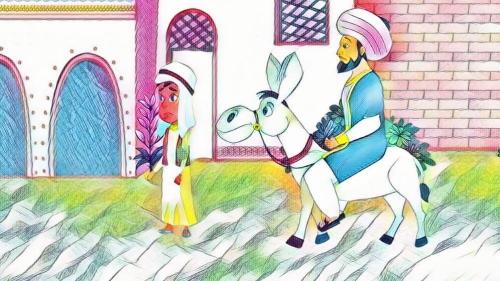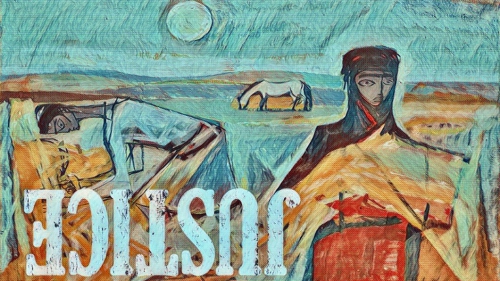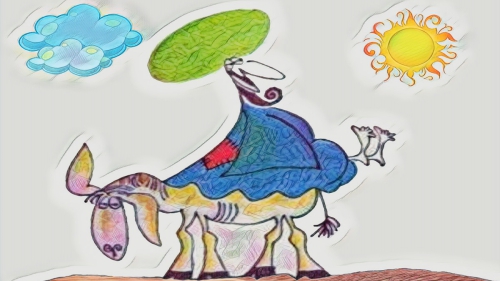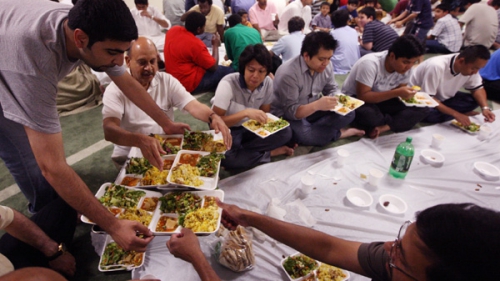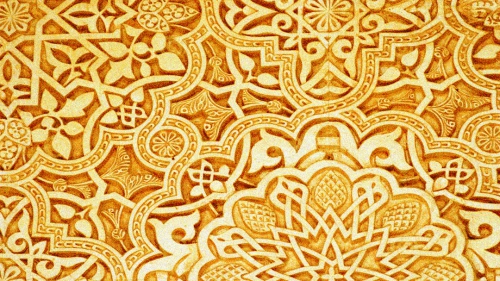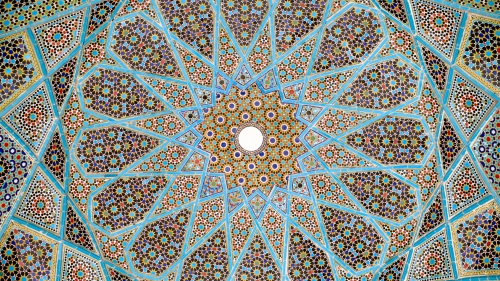Mulla Nasruddin Khodja, a Major Character of Muslim Satiric Literature
Introduction
 |
Nasr al-Din Khodja, known also as Mulla Nasruddin or simply Nasruddin, is the starring character in a vast number of amusing tales told in regions all over the world, particularly in countries in or near the Middle East. Each tale depicts Nasruddin in a different situation, and through his viewpoint they humorously reveal commentary and lessons on various life themes. The great allure of the Mulla Nasr al-Din tales is that they are funny as well as lesson filled, philosophical, and thought provoking.
According to different sources, Nasr al-Din Khodja was a philosopher, wise, witty man with a good sense of humor. His stories have been told almost everywhere in the world, spread among the tribes of the Turkish World and into Persia, Arabia, Africa, and along the Silk Road to China and India, later also to Europe. Of course, all these stories currently attributed to the Khodja for about 700 years haven't originated from him. Most of them are the product of collective humor of not only Turks but also other people of Islamic and Asian cultures. Nasr al-Din is known to us under different names in the world. Main variants are: Turks say "Nasreddin Hoca", for Kazakhs he is "Koja Nasreddin"; Greeks call him "Khodja Nasreddin", whilst Azerbaijanis, Afghans and Iranians refer to him as "Molla or Mulla Nasrudin;" in the folklore of Arab peoples in the Middle East and North Africa, he is "Juha". And some spellings of the Arabic form of his first name Nasr al-Din are: Nasreddin, Nasrudin, or Nasr ed-din. The year 1996 was proclaimed "Nasreddin Hoca Year" by UNESCO. He is, now in 2007, 799 years old.
Biographical sketch
Nasr al-Din was the label of the most popular character of humour prose narratives in the whole area of Turkish-Islamic influence, ranging from the Balkan area to the Turkish-speaking peoples of Central Asia and in other areas of the Islamic world. He is a renowned personality whose historical existence is still problematical, as the various theories regarding his biography did not succeed to build certain facts. From the 16th century onwards, this personality served increasingly as a point of crystallization for an otherwise formless, popular tradition of aphorisms, epigrams, jokes, jests, and anecdotes of different origins.
Stories credited to Nasr al-Din Khodja can be found in manuscripts from as early as the 15th century. The earliest story occured in Ebu'l-Khayr-i Rumi-Saltuk-name (1480).
According to anecdotes in this book, Nasr al-Din was a dervish of Seyyid Mahmud Hayrani in Aksehir, in the northwest of modern Turkey. Other anecdotes about him in the Turkish language are quoted in Lami Celebi's (d. 1531) story book Leta'if.
However, there is no exact agreement among chroniclers as to the real identity of Nasr al-Din Khodja. While Lami Celebi mentions Nasr al-Din as a contemporary of Sheyyad Hamza (14th century), the decisive influence for subsequent popular tradition, and notably, later European learned discussions, derives from Evliya Celebi, who visited Nasr al-Din's alleged tomb in Aksehir in the 17th century and quotes an anecdote in which Nasr al-Din is depicted together with the Mongol ruler Timur-leng (d. 1405).
In later centuries, Hseyin Efendi (d. 1880), the Mufti of Sivrihisar, writes in Mecmua-i Maarif that Nasr al-Din was born in 1208 in the village of Hortu (today Nasreddin Hoca Ky) in the region of Sivrihisar and died in 1284 in Aksehir, the town he had immigrated to.
According to this source, he was educated respectively in Sivrihisar and Konya schools. He learned fiqh (jurisprudence) and met Mawlana Jalal al-Din al-Rumi(1207-1273) in Konya and learned Sufism from him. He followed Seyyid Mahmud Hayrani as his Sheikh. By doing so, he went to Aksehir and married there. He became an imam and, later, a judge there. In this city, his high sense of humour and smart comments, decisions and anecdotes made him a notable and sought after member of society.
Nevertheless, there are limited established facts about Nasr al-Din Khodja's life. It is certain that he lived in Anatolia at the end of the 14th century and the beginning of the 15th century. An acceptable fact also is that he was born in Hortu, a village in Sivrihisar in the region of Aksehir in the late 13th century, and then settled in Aksehir city, and later in Konya. His tomb is in the city of Aksehir, near Konya. His grave has an iron door with a huge padlock on it. But if one intends to pay him a visit, there is no need to feel dispirited by the locked door. There are no walls around the grave !!
Beginning in Turkish tradition, Nasr al-Din's reputation soon extended all over the provinces of the Ottoman territory, the character meanwhile integrating narrative materials originally attached to other characters. Beside Turkey, Nasr al-Din himself and his anecdotes are well known in different places of the world, especially in Arabic and Persian folklore. His stories are told in a wide variety of regions, and have been translated into many languages. In many areas, Nasr al-Din is a major part of the culture, and he is quoted or alluded to frequently in daily life. Since there are thousands of different Nasr al-Din stories, one can be found to fit almost any occasion. His stories are renowned in various regions and languages such as Albanian, Arabic, Azeri, Bengali, Bosnian, Hindi, Pashto, Persian, Serbian and Urdu folk tradition, Croatian and Caucasian languages even in Chinese in similar name.
From a point of view contemporary to the manuscript tradition, it may safely be assumed that these tales did not constitute a major offence; rather it is to be supposed that they represent humorous attitudes of a direct and outspoken kind, not yet submitting to restrictions by the requirements in content and form that later were established by refined literary developments. While it must remain doubtful whether the early collections represent anything that safely might be termed as "folk" literature, it seems most certain that this kind of crude story still today enjoys a large reputation.
As generations went by, new stories were added, others were modified, and the character and his tales spread to other regions. The themes in the tales have become part of the folklore of a number of nations and express the national imaginations of a variety of cultures. Although most of them depict Nasr al-Din in an early small-village setting, the tales deal with concepts that have certain timelessness.
Nasr al-Din's tales
Nasr al-Din stories are known throughout the Middle East and have reached cultures around the world. Apparently, most of Nasr al-Din stories may be told as jokes or humorous anecdotes.
The anecdotes attributed to Nasr al-Din reveal a satirical personality with a biting tongue that he was not afraid to use even against the most tyrannical rulers of his time. He is the symbol of Middle-Eastern sarcastic, ironic and satirical comedy and the rebellious feelings of people against the dynasties that once ruled this part of the world. A part of the background of the stories represent also a critical attitude against dominant social morals, where people seek selfish interest without paying real attention to principles of good doing.
Some stories of Nasr al-Din are also adapted and used as teaching stories by Sufi order followers. This is such a common practice that, given the nature of many of Nasr al-Din's jokes, multiple interpretations are to be expected.
A Few Anecdotes of Khodja
You can't please everybody
 |
The late Nasr al-Din Khodja was on his way to the village with his son. The boy was riding their donkey. They met two women on the road and they heard one say to the other."Oh, for the days of youth! The boy rides in ease while his old father walks. Amazing!"
"Father," the boy exclaimed, "you insisted I ride, didn't you? Come on, don't be stubborn. You ride the donkey!" and they went on down the road, Khodja riding, the youth walking, after awhile they met two old men limping alone. "Hey, old man!" they said,
"Your bones are already old and dry. You've got one foot in the grave. But this young sprout, does he deserve to dry up like you? Let him ride!" After they had passed, Khodja pulled his son up onto the donkey with him. They went along under the hot sun and then they came to a group of busy bodies sitting beside the road. "Oh, the cruelty! That poor animal. It's too much, two people riding! The poor beast it's about to die. Look at this guy, and he's even a Khodja!" "Oh, for God's sake," Khodja said. He got off the donkey and they walked along together, driving the donkey in front of them. But in the next moment they encountered two men standing beside the road.
"Allah Allah, (God) look at these idiots! The donkey goes on ahead, jumping and hopping with no load on its back, and they walk behind, streaming with sweat and covered with dust. What stupid people there are in the world!" Finally Khodja turned to his son and said,
"Look here! Hooray for the one who can escape from the tongues of people! There will always be someone who is not pleased with your doings. So work only to please Allah (God)."
 |
Aren't we moving in here?
One night a thief entered Khodja's house and stole all kinds of things. After he left, Khodja grabbed the first thing he could put his hands on, which happened to be a strainer, and followed him out the door. He followed the thief all the way to his house, and even tried to go in after him. The surprised thief said, "What are you doing in my house?" "You're bringing all our stuff here, Khodja said... I thought we were moving in, too?
 |
Backwards on the Donkey
One day Khodja and his students were on their way to their lesson. Khodja was sitting backwards on his donkey. "Khodja, they asked him "Why on earth do you sit that way? Isn't it uncomfortable?" "If I sit the other way," he answered, "you would all be behind me and we wouldn't be face-to-face. Riding this way is better."
This article was provided by the muslimheritage.com group
Selected references
- Aryanpur Kashani, Abbas, 'Abbas., Stories of Mulla Nasr-ad-Din. Tehran: Golshan Print. House, 1970.
- Arslan, Mehmet, Paacioglu, Burhan., Leta'if-i Hoca Nasreddin. Sivas [Turkey]: Dilek Ofset Matbaacilik, 1996.






